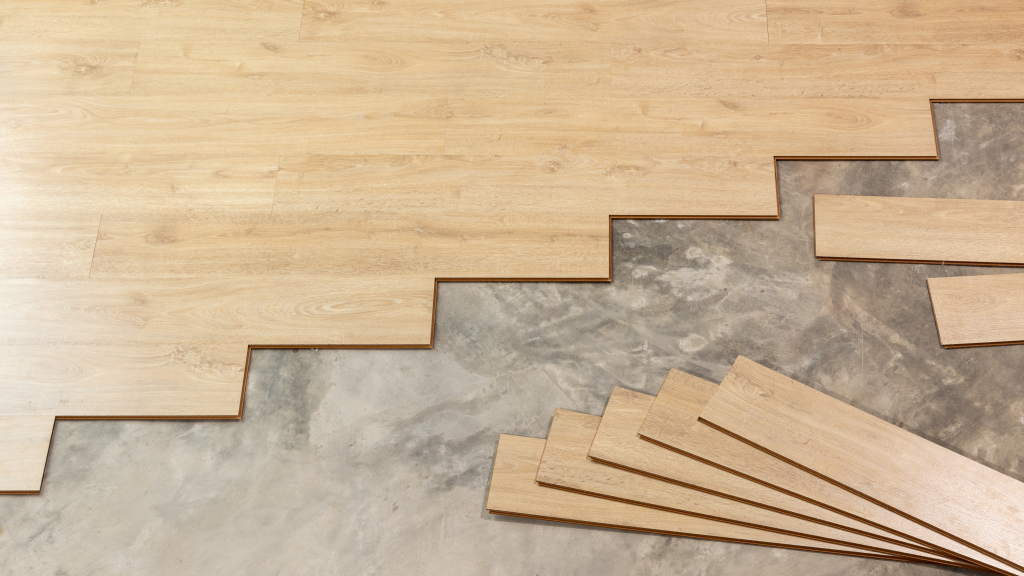02 Jun Is vinyl flooring slippery?
Vinyl flooring is a popular choice for homes and businesses alike, offering a stylish and affordable alternative to traditional materials like hardwood or tile. However, a common concern regarding vinyl flooring is its potential for slipperiness. This can be a safety hazard, especially in areas prone to moisture or spills.
So, is vinyl flooring inherently slippery? The answer, like most things in life, is not a simple yes or no. Let’s delve deeper into the factors that influence the slip resistance of vinyl flooring and explore ways to ensure a safe and secure walking experience.

The Science Behind Slip Resistance
Slip resistance refers to a floor’s ability to provide traction and prevent slipping. It’s measured by a coefficient of friction (COF) rating, with higher values indicating better slip resistance. Vinyl flooring manufacturers prioritise safety and often incorporate features to enhance COF.
Here are some key elements that contribute to a vinyl floor’s slip resistance:
- Textured Surface: Many vinyl planks or tiles have embossed or textured finishes. These grooves and patterns provide additional grip underfoot, particularly when wet.
- Wear Layer: The wear layer is a protective top coating on vinyl flooring. A thicker wear layer often translates to improved slip resistance.
- Material Composition: While most vinyl is polyvinyl chloride (PVC), some manufacturers incorporate additional materials like glass fibres to enhance durability and slip resistance.
Factors Affecting Slip Resistance of Vinyl Flooring
Even with built-in features, several external factors can influence the slip resistance of vinyl flooring:
- Moisture: Water on the surface can significantly reduce COF, making any floor, including vinyl, more slippery.
- Spills: Spills like cooking oil, soap scum, or cleaning products can leave a slippery residue, increasing the risk of falls.
- Cleaning Products: Using harsh or inappropriate cleaning agents can damage the wear layer and leave behind a slippery film.
- Dirt and Debris: Dirt, dust, and other loose particles can act like tiny ball bearings, reducing traction on the floor.
How to Maintain Slip Resistance of Vinyl Flooring
Here are some practical tips to ensure your vinyl floors remain safe and slip-resistant:
- Promptly Clean Up Spills: Don’t let spills linger. Wipe them up immediately with a damp mop or cloth to prevent residue build-up.
- Use Proper Cleaning Products: Opt for cleaners specifically formulated for vinyl flooring. These products are less likely to leave behind a slippery film.
- Maintain a Clean Floor: Regularly sweep or vacuum your vinyl flooring to remove dirt and debris that can compromise traction.
- Place Throw Rugs in High-Traffic Areas: Throw rugs in kitchens, bathrooms, or entryways can provide additional slip resistance and absorb moisture.
- Consider Floor Mats: Especially in areas prone to spills, consider placing floor mats with a non-slip backing for added safety.
Choosing Slip-Resistant Vinyl Flooring
When selecting vinyl flooring, consider these points to prioritise slip resistance:
- Look for Textured Options: Textured vinyl planks or tiles offer superior traction compared to smooth finishes.
- Check the COF Rating: While not always readily available, some vinyl flooring products might display their COF rating. Higher COF indicates better slip resistance when wet.
- Ask About Material Composition: Inquire about the presence of additional materials like glass fibers that can enhance slip resistance.
Additional Safety Considerations
While choosing the right vinyl and maintaining it properly are crucial, here are some additional safety measures to consider:
- Doormats: A good quality doormat outside your entryway helps remove moisture and dirt from shoes before entering, reducing the risk of tracked-in slippery substances.
- Area Rugs: Area rugs not only enhance aesthetics but also provide additional traction, especially in high-traffic areas.
- Proper Footwear: Encourage family members, especially children and the elderly, to wear shoes with good traction inside the home. Avoid smooth-soled slippers, as they can increase the risk of slips.
Key Takeaway
Vinyl flooring can be a safe and stylish addition to your home or business when proper precautions are taken. By understanding the factors influencing slip resistance and implementing the tips outlined above, you can ensure your vinyl floors provide a secure walking surface for everyone. If you have any concerns about the slip resistance of your existing vinyl flooring, consult a flooring professional for recommendations.
Eastwood Carpets & Flooring are Sydney’s leading flooring experts. Our team has been helping people transform their residential and commercial spaces for over 35 years.
Click Here To Call Our Showroom Now
Follow Us On Instagram • Connect With Us On LinkedIn
If you’d like to chat about your project, please call us on (02) 9638 2766 or fill out the form on our contact page and our team will be in touch.



